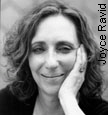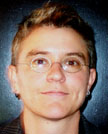|

he world premiere of Gertrude Stein Invents A Jump Early On by poet Karren LaLonde Alenier and composer William Banfield goes
on stage in New York City, thanks to Nancy Rhodes and Encompass New Opera Theatre, June 15-18, 2005. As educational outreach prior
to the premiere, Director Rhodes and the Steiny Road Poet have arranged an arts salon free and open to the public at the CUNY Siegel Performing Arts Center June 10 that will feature sample arias sung by
Encompass performers and a panel of authors who have written about Stein.
AVANT-GARDE THEATER, GENIUS, SIBLING RELATIONSHIP
The panel, moderated by Nancy Rhodes, includes Karren Alenier; Sarah Bay-Cheng, author of Mama Dada: Gertrude Stein's Avant-Garde Theater; Barbara Will, author of Gertrude Stein, Modernism
and the Problem of "Genius"; and Brenda Wineapple, author of Sister Brother: Gertrude and Leo Stein. The focus of the salon is to raise
awareness about Gertrude Stein and the new opera that bears her name.
GOING BEYOND STEIN
To prepare for the salon, the Poet developed ten questions to which each of the panelists was asked to respond. These questions ranged
from how the author got interested in Stein to what the author is currently working on. Most provocatively, the Poet invited the authors to ask questions of each other and the creators – Poet, Composer, and
Director.
Brenda Wineapple, who distinguishes herself as a writer but not an  "academic," asked the Poet why she did not use Stein's texts in writing Gertrude Stein Invents A Jump Early On? Sarah Bay-Cheng, who refers to herself
as theater scholar of Stein, asked a series of questions that probe the difficulties in writing creative work in which Stein is the central character. "Are there specific challenges to representing a person
who became an icon, and for whom there are so many other theatrical adaptations? How does one remain faithful to Stein's language without
imitating her style?" Barbara Will, who is currently working on a second book about Stein entitled Unlikely Collaboration: Gertrude Stein, Bernard Faye and the Vichy Dilemma, asked what led the Poet to Stein
? "academic," asked the Poet why she did not use Stein's texts in writing Gertrude Stein Invents A Jump Early On? Sarah Bay-Cheng, who refers to herself
as theater scholar of Stein, asked a series of questions that probe the difficulties in writing creative work in which Stein is the central character. "Are there specific challenges to representing a person
who became an icon, and for whom there are so many other theatrical adaptations? How does one remain faithful to Stein's language without
imitating her style?" Barbara Will, who is currently working on a second book about Stein entitled Unlikely Collaboration: Gertrude Stein, Bernard Faye and the Vichy Dilemma, asked what led the Poet to Stein
?
If a libretto has any value to audiences far into the future, the answers to these questions all need to go beyond Gertrude Stein and the
personal situation of the poet-librettist who created the original verse play Gertrude Stein Invents A Jump Early On. Most likely these will be
the questions asked over and over by those who hear about the opera but have not yet experienced it. So the Steiny Road Poet welcomes the challenge to respond while she has presence of mind to reflect
thoughtfully.
WHAT'S THE DRAW TO STEIN?
For Karren Alenier, Gertrude Stein represents the archetypical, experimental writer of extraordinary intelligence struggling to find
her/his voice, face the critics, and deal with the outcome. Stein never wavered in setting forth her creative vision of the world and what's more, Stein's struggle continues today. What Stein represents, in
combination with a huge body of complex work that always reveals new insights in re-reading and the fact that the person Gertrude Stein was a
human being who failed at certain things like maintaining a relationship with the brother who for many years she loved deeply, captures most of
the impetus that has caused Karren Alenier to spend over thirty years writing creatively about Gertrude Stein.
STEIN, THE ICON
One of the reasons the Steiny Road Poet insists on being called poet and not librettist is because she is a poet and exercised her skills as
poet in the Stein opera without imitating the writing of Gertrude Stein. What has seeped into Karren Alenier's poetry may be some Steinian
influence. On the practical side, Alenier made a business decision to keep the number of quotations from Stein's work to a minimum to avoid complicated royalty issues with the estate of Gertrude Stein.
Once the Steiny Road Poet moved in the direction of writing an opera based on Gertrude Stein's life and work, she became deeply
concerned about what other theater work existed that focused on Stein. Research for her Steiny Road essay on this topic led her to Sarah Bay
-Cheng's book Mama Dada: Gertrude Stein's Avant-Garde Theater. Except for Jonathan Sheffer's Blood on the Dining Room Floor, which is
based on several source materials from Stein and Toklas, no other opera that depicts Stein and her writing has been produced. In the case of Blood on the Dining Room Floor, Sheffer who is a composer
also served as the librettist.
STEIN: A WIDE LANDSCAPE OF CONTROVERSY
One other question the Poet asked of the Stein authors stirred the pot of controversy:
"It takes a certain chutzpah to write about Stein's life. Much has been said, including by Stein herself, that too much attention has been given
to the events of her life. In your opinion, what is the most egregious mistake one could make in the telling about Stein?" Brenda Wineapple said taking Stein at face value is a big problem. For example
Wineapple offered, "People tend to read [Stein's] autobiographies as if they were scriptural rather than literary poses."
Barbara Will counters that if one is "historically informed, careful, and  not pushing an agenda" mistakes won't be made. But Will, who is researching Stein's Vichy connection, also says that some people see Stein as a "gung
-ho Fascist, [while] others refuse to admit that she had any pro-Fascist leanings whatsoever. In fact her attitudes and behavior lie in an historical 'gray zone' that is often hard to talk about." not pushing an agenda" mistakes won't be made. But Will, who is researching Stein's Vichy connection, also says that some people see Stein as a "gung
-ho Fascist, [while] others refuse to admit that she had any pro-Fascist leanings whatsoever. In fact her attitudes and behavior lie in an historical 'gray zone' that is often hard to talk about."
Sarah Bay-Cheng said because Stein is "so complex, there are many  distinct parts of her life story to be told." The part of Stein's life that Bay-Cheng finds lacking is when people talk about Stein and theater. "I find that many
theatrical representations tend to ignore what Stein herself thought about the theater, or they fixate on the few lines from Plays in which she says she never
went to the theater or cinema." A good example, says Bay-Cheng of Stein and her avant-garde theater, is the Wooster's Group's House/Lights which "captured the
feeling of Stein's play [Dr. Faustus Lights the Lights] without necessarily being literal to the written text." distinct parts of her life story to be told." The part of Stein's life that Bay-Cheng finds lacking is when people talk about Stein and theater. "I find that many
theatrical representations tend to ignore what Stein herself thought about the theater, or they fixate on the few lines from Plays in which she says she never
went to the theater or cinema." A good example, says Bay-Cheng of Stein and her avant-garde theater, is the Wooster's Group's House/Lights which "captured the
feeling of Stein's play [Dr. Faustus Lights the Lights] without necessarily being literal to the written text."
DID STEIN ARRIVE OR JUST CREATE THE PRESENT MOMENT?
What the Steiny Road Poet hopes is that the Stein Arts Salon will pique the curiosity of college students and young professionals as well as hip
seniors who may remember their parents talking about Gertrude Stein when she came to America on her 1934-35 lecture tour. The central core of Gertrude Stein Invents A Jump Early On is what happens to a
writer when she seemingly arrives. With Gertrude Stein and her work, every day is a new arrival and that is precisely why there are so many books showing up in the marketplace and new theater pieces arriving
on stage. Stein would like this – it fits with her philosophy of staying in the present moment.
|